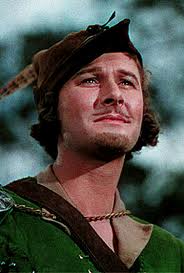 One of the cool things about Thanksgiving is you get a little more space to do stuff normally you just don’t have time to do. One of the things I liked this past weekend was watching the 1938 version of Robin Hood with Errol Flynn. Pretty classic.
One of the cool things about Thanksgiving is you get a little more space to do stuff normally you just don’t have time to do. One of the things I liked this past weekend was watching the 1938 version of Robin Hood with Errol Flynn. Pretty classic.
There’s a great scene of where Robin Hood and Little John first encounter one another in an attempt to get the other to yield first. It’s not quite as elaborate or finely choreographed as the encounter in the Kevin Costner version, but nonetheless it’s a classic scene.
Robin Hood actually gets beat in a dual on a log that serves as a bridge from one side of a river to the other. He, Little John, and Will Scarlet are laughing about it afterwards and Little John makes a comment to Robin that he hopes he won’t hold it against him, considering he was coming to look for Robin Hood and join the “merry men.” Robin Hood’s response is, “On the contrary, I love a man who can best me!”
It’s a rare leader who truly goes out of their way to surround themselves with people that actually can “best them” or maybe more realistically “shine” or excel in different ways that the leader may not be able to. Typically such a strong presence of another skilled or gifted person might be viewed as a threat to control or ego. This scenario in some ways captures the difference between the narcissistic leader and the servant leader.
The narcissistic leader is threatened by anything that might potentially undermine their “authority” while the servant leader is secure enough to try to empower other leaders rather seek control over them. While the leader may not be as strong or gifted as others may be, the leader can “shine” by helping or serving these other leaders by maximizing their contributions and help each one of them “shine” even brighter. Narcissistic leaders would rather shine themselves rather than help others shine brighter.
I can’t write this and not think about my dad, who I think is an excellent example of servant leadership. I’ve watched over the years as he has had the privilege to lead a variety of leaders, some of which have had extraordinary gifts and talents in the ministry. I don’t think I’ve ever seen him threatened, but have tons of examples of how he has helped leaders shine brighter than they would have, had he not come alongside them in such a manner. It’s great to have such a model of what secure servant leadership looks like in a day in age where there’s a lot of anxious and insecure leaders in the world.
Addendum:
I find it interesting that while Robin Hood actually loses to Little John in the famous river duel in the 1938 version, the Kevin Costner version actually shows Robin Hood the victor over Little John – though he did take quite a beating. I’m not sure why they chose to go this route, but it seems like the 90’s Robin Hood reflects more of the stereotype “Alpha Male” leader than the 1938 version. From a leadership standpoint, I would definitely go with Errol Flynn’s Robin Hood over Kevin Costner’s because of how this one particular scene illustrates how an authentic, secure, servant leader will more likely attract other real leaders (as opposed to followers) than a leader who always must be the “Alpha Male.”
Of course, maybe Robin Hood should have just backed up and let Little John across in a gesture of humility. Though Flynn’s Robin Hood says the reason he didn’t do that is because he was wanting to find out what he was made of.

Great application of the metaphor! I especially like the comparison of the two versions. I wonder though about it being a reflection of the Alpha Male mentality since the culture surrounding Flynn’s version and the original folk stories (I assume they include some version of the same scenario) would be even more prone to that type of representation. I’m wondering if it reflects the increasing sense of individualism and self-importance that pervades our culture. In this sense we as an audience would be less receptive to a hero who could lose at something. I realize you were discussing things in context of leadership and using “Alpha Male” in a larger sense of the term, but I think my reading works also to describe the dynamic you mention. The individualized leader is practically by definition poor at recognizing his or her subordinate position within a team.
Brian, you know I love this one!
I have always liked how the two men quickly and comfortably, assert who they are and begin to define themselves, hold nothing back in the encounter, and recognize they are genuinely better together by the end!
The 38 version will always be my favorite.
jeff – thanks for the thoughts. You’re right, Alpha Male may not be the best distinction. I too found the cultural component interesting. I tried to imagine Bruce Willis maintaining his action hero status if he was no longer “the man.”
I found it odd too that there would be such a portrayal of a leader with “soft skills” anchored in personal security during an era that was pretty patriarchal (is that the term?) Anyway, your summary at the end captures the dynamic. The point I really was drawn to was the impact of this type of leader in either repelling or attracting other quality leaders.
wow, so insightful you guys. i’m impressed with the lessons you drew out of the film. i need to see it! i love my family… and the non-anxious male leaders in it.